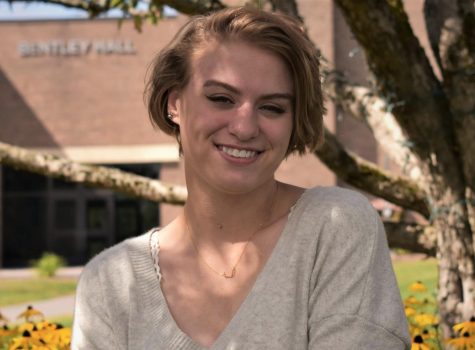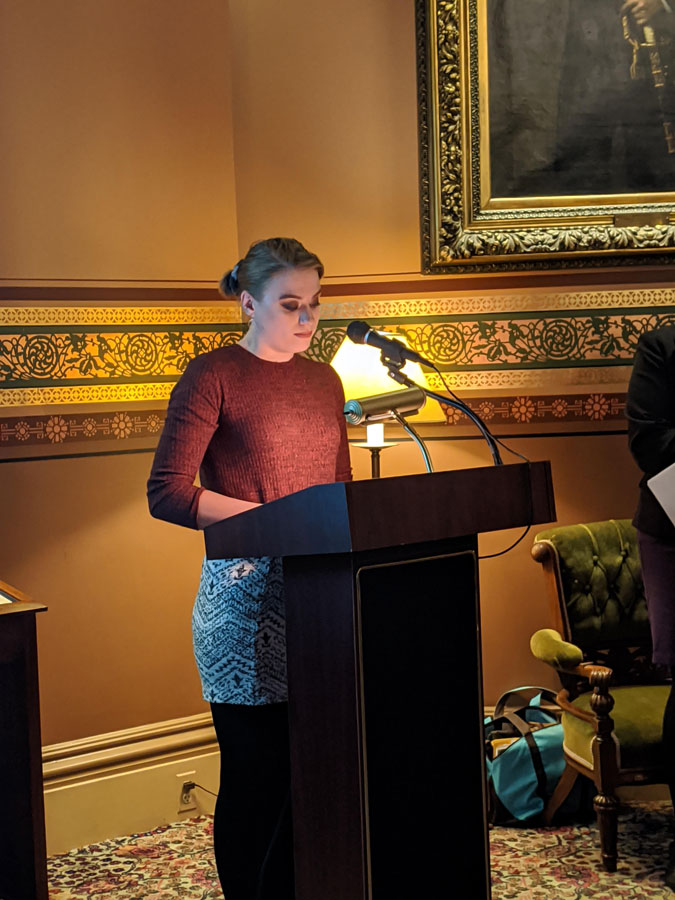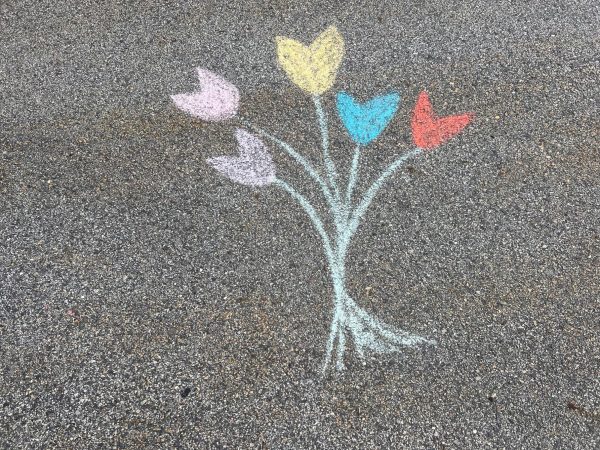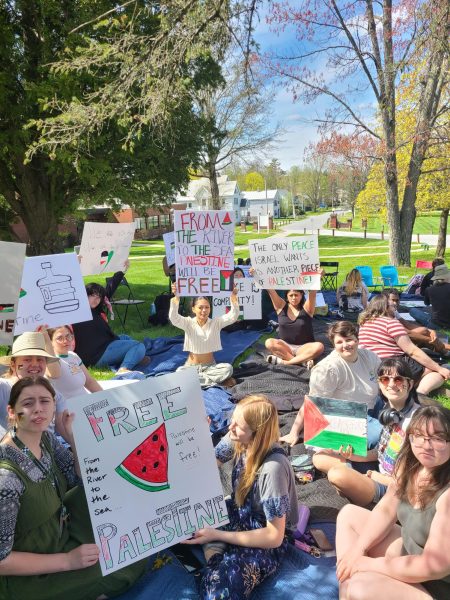A frustrating reception
Adriana Eldred
Northern Vermont University had a reception at the Vermont Statehouse the afternoon of Feb. 26. During the two-hour event, there was a light flow of bodies filtering through the doors, but the majority of the attention was directed to the hors d’oeuvres on the center table. Light chatter filled the Cedar Creek Room – those of staff, faculty, alumni, and the occasional legislator.
I was informed that the event would begin while legislators were still in session, but it seemed to be the expectation that they would wrap up before we left.
My manila folder, containing my written speech, creased as my nervous hand fidgeting continued. We had been there for twenty or so minutes, and there didn’t seem to be many new people filling the room quite yet.
“You’re going to do great,” said one of my companions, reassuringly. I could say less for how I felt the event would go. Not only was it scheduled during a break week, and during a hot-topic session about cannabis, but just hours before, the University of Vermont had held a similar higher-ed advocacy event in the cafeteria.
The NVU Statehouse reception was scheduled during a break week. There had been little – if any – advertising to invite students to join the event as it were, never mind the feat of finding their way to Montpelier from their distant homes. I was lucky enough to have two students carpool with me to the event.
There were very few faculty members in attendance, and most faces I recognized were from the Johnson campus.
In a recent email, NVU External Relations Officer Leah Hollenberger acknowledged the less-than-ideal timing. “I would like to add that when the event was scheduled, Feb. 26 was the only date available on the legislative calendar,” wrote Hollenberger, “which was unfortunate as it fell during a vacation break. If we do this again, we’ll plan earlier so that we can avoid vacation weeks.”
While I can see the good intention, this still frustrates me – what is the value in scheduling an event if it doesn’t actually end up creating any impact? Why do an event at all?
Hollenberger also included in her email to me a list of legislators who did attend – or at least in her words, “stopped by.” People like House Education Committee Chair, Representative Kate Webb; Senator Ruth Hardy, member of the senate committee on education; and members of the House Committee on Appropriations, and a handful more. I can attest they were at least not in the room long enough for me to seek them out during the two hours I hovered in that room, looking for legislators to engage with.
Not only were legislators MIA, but there was a heinous lack of students in the room. Other than myself and my carpoolers, there were no students to be found. This is unacceptable in my eyes.
Many students are unaware of the situation the college, and the state college system, is in; while we aren’t about to crash into an iceberg, there is an undeniable leak sprung, and it has been sprung for a while now. Many students only end up with an intangible feeling that the future of higher education is in jeopardy, and while they don’t know what exactly is going on, they know it is important. But how can they truly worry about it if they are caught up in scrambling to pay their outstanding student account balance or write their next midterm paper?
At one point a half an hour in, the largest group of people we saw that entire evening had gathered in the space – a generous twenty or so. I was then able to give my speech, which I am elated to have given.
Several hours prior, the NVU marketing and public relations director had called me while I was getting ready in my apartment. She sent me a draft of edit suggestions to include in my speech. While she did give me helpful feedback, she also wanted me to pull a lot of my language.
I was accommodating as possible, but I chose to remain firm in my stance. I still included phrases she suggested removing, such as my statement that Vermont State graduates are invaluable to the Vermont workforce, “and to repay them by making it harder and harder to access an education is unacceptable.” She suggested I cut the section about how “my ability to pay for college is constantly jeopardized.”
Legislators need to realize that students are struggling, and I chose to include my personal struggles – and successes – as much as possible in my testimony. As a senior, any new appropriations will not affect me. I refuse, however, to sit idle as my fellow students still continue to struggle to find accessible education in a system that is not built for them.
While the NVU administration is clearly trying to do their part to serve students’ best interest, they are doing it without including the very people it affects – students. Students are often uninformed on the issues, and while there have been some attempts to reach out, there has been a glaring lack of transparency between the administration and the student body. Sure, there were open forums held on campus during the White Paper proceedings, and a few geared towards the unification process.
But administrators have done an unsatisfactory job in meeting students where they are, or understanding the complexity of our student body, and that became terrifyingly obvious that Wednesday evening.
Brief congratulations were exchanged after the speeches of myself and successful alumna Monique Priestley, but the room promptly deflated afterward. I was able to talk to one legislator for the rest of the evening – one.
I remain hopeful that we did make some impact, but I am also skeptical we did any good for our institution. If there is any take-away from that evening, it is that I and the students at NVU need to advocate harder, because our seat at that table is empty, and we need to fill it.

Senior, Journalism & Studio Art
Grew up in Craftsbury, VT
Spring 2018 - Present
I got a black eye and mild concussion in Las Vegas during a rugby...

Senior, Journalism & Creative Writing
Grew up in Atkinson, NH
Fall 2018
Along with traditional journalism, I enjoy writing satire and fun feature...




